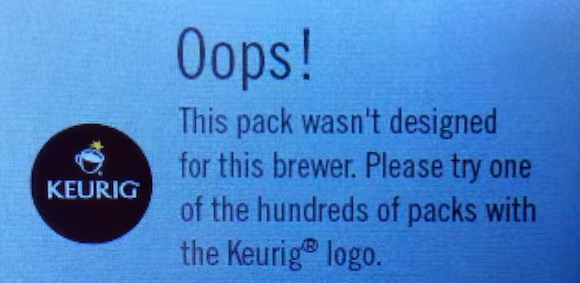Even The Inventor Of K-Cups Regrets His Coffee Mistake
Pod coffee has proved controversial for its taste and its ecological impact, and no single-serve option has been more contentious than Keurig's K-Cups. On the one hand there's the convenience: drop in a pod, hit the button, and seconds later be drinking hot coffee. On the other, though, there are questions around freshness, the poor recyclability of pods, and – particularly in Keurig's case – the use of patents and DRM to lock consumers to a single brand. Turns out, even the guy who created K-Cups in the first place now regrets it.
Although you could accuse John Sylvan, who in 1990 set up Keurig with college roommate Peter Dragone, of being naive about it, the initial belief was that the single-serve cups would only really make an impact in office environments.
The target audience was office drones who might want to bypass their usual Starbucks and instead just get a quick cup of coffee when they made it to their desk, Sylvan told CBC News. In fact, had that been the case the inventor argued, it could've been a net-win for the environment.
"That would make it environmentally neutral," he says, "because you wouldn't have those Starbucks cups [everywhere]."
Instead, the ease of use – and the absence of clean-up afterwards – struck a chord with home users, and K-Cup machines began to appear on kitchen counters. The pods themselves are surprisingly complex, each consisting of four layers of different plastic. That has a knock-on effect on what can be done afterwards with the spent K-Cups, which cannot currently be recycled.
Sylyvan sold his stake in Keurig in 1997, making $50,000 in the process. Present owner Keurig Green Mountain has gone on to turn it into a $5bn a year business.
For Sylvan, it's the price-per-cup and the environmental footprint that now rankle. Though Keurig Green Mountain insists it will have recyclable K-Cups on the market by 2020, the inventor himself is skeptical, arguing that he sees no way such a product could be developed.

Keurig found itself at the sharp end of bad press and consumer backlash last year, when it revealed its "K-Cup 2.0" pods would switch to a system including DRM so that only official supplies could be used.
The aftermarket community wasn't slow to rise to the challenge, however, first finding workarounds for the DRM, and then devising products like the so-called Freedom Clip which bypasses 2.0's lock-down.
SOURCE CBCNews
IMAGE Patrick Gensel
